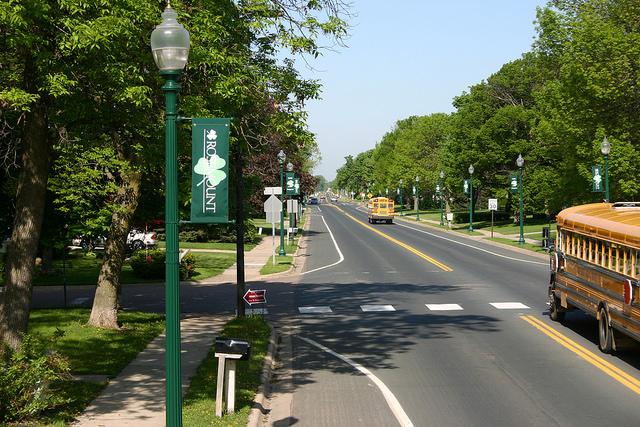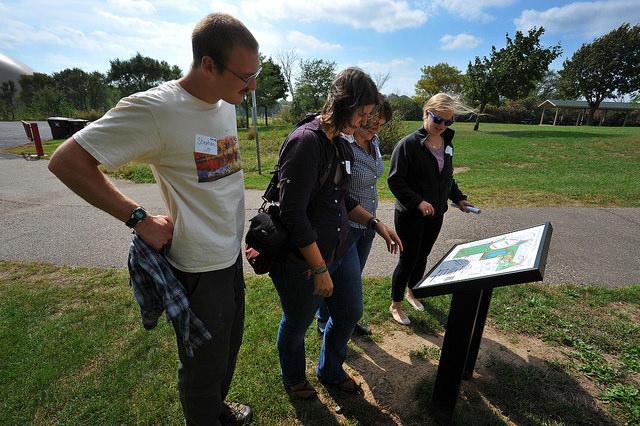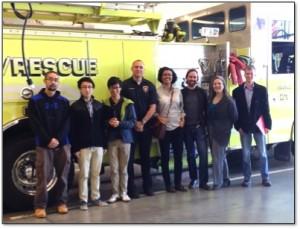By Bridget Roby
Tools for promoting nature-based play. Recruitment strategies for the volunteer fire department. Concrete steps toward STAR certification—a national rating system for sustainable communities. These are just a few of the benefits Rosemount is reaping from its year-long partnership with the University of Minnesota through the Resilient Communities Project last year.
Throughout the 2014–2015 academic year, more than 400 U of MN students and faculty partnered with the City of Rosemount to tackle 29 community-identified projects related to economic development, environmental planning, community engagement, and more. As we move into the second half of our collaboration with Carver County, RCP staff have been looking back on our partnership with Rosemount to see what’s happened since student reports were handed over.
To showcase the accomplishments and some of the benefits of the partnership, we are in the final stages of creating an annual report that shares some of the early successes and student findings. According to Rosemount Mayor William Droste, the project has already made a difference in their community and will continue to have an impact as staff and elected officials process and put to use student recommendations.
“I knew we were going to receive a lot of input on various projects, but what we received ultimately was very high quality,” Mayor Droste said. “It was great information for us as a City Council to look at, plan, and figure out how to utilize the information going forward in a positive way for the citizens in our community.”
At the end of each project, students typically hand over 20- to 60-page reports filled with analyses, findings, and recommendations, so City staff and others leaders have their hands full processing the influx of information and determining next steps. As a result, it can often take months—or even years—before the true benefits of each project are realized. Yet there are several projects from last year that stand out for their immediate take-aways, including those related to nature-based play, recruitment and retention of local volunteer firefighters, and environmental planning for national STAR certification.
Garnering support for nature-based play
According to Rosemount Parks and Recreation Director Dan Schultz, a video describing nature-based play created by Dr. Tony Brown’s recreation and wellness students has already been a hit. As research has grown on how nature-based play improves health and development, the Parks and Recreation Department has wanted to bring more of nature back into the lives of residents. For the idea to stick, however, they needed support.
“[The video] really educated the parks commission as to what we were talking about,” Schultz said. “We popped the video in, and the whole thing was taken care of for us.”
The work of both Dr. Brown’s students and other graduate students working on the issue of nature-based play helped propel the issue into the public dialogue and—hopefully—into the next parks master plan.
“It has helped us speed up the process,” Schultz said. “At least this year and last year, we wouldn’t have had time to go out and do this research. It would have kept getting pushed to the backburner.”
Recruitment and retention strategies for local firefighters
According to Fire Chief Rick Schroeder, the fire department has already begun to implement several of the students’ recommendations, including working to attract more firefighters from area businesses and city government itself, and providing more feedback to firefighters to evaluate their performance. This past summer, the department’s command staff conducted one-on-ones to increase volunteer feedback.
“I was able to pull some valuable recommendations from [the students’] findings that will prove to be useful in the future when attracting new applicants as well as creating ways to retain them.”
Steps toward national STAR certification
Perhaps most publicly, the partnership helped Rosemount work toward STAR certification—a national framework for sustainable communities. According to former Rosemount planner Jason Lindahl, several of the projects Rosemount identified as priorities in the partnership were specifically designed to help the city work toward this prestigious certification. Among the forefront were projects related to climate adaptability and the reduction of greenhouse gas emissions.
Eight teams of students from a range of academic disciplines—including public policy, law, and adult education—worked on various aspects of the projects and offered a variety of recommendations for making Rosemount more sustainable in the face of climate change. In March 2015, Rosemount became the smallest city to date to achieve certification under the national STAR Community Rating System.
“[The RCP projects] helped provide more specifics for us to be able to fulfill more parts of the STAR assessment, so it helped us move toward that certification,” Lindahl said.
Altogether, these benefits represent just a few of many stemming from the nearly 30 projects with Rosemount last year. Check out the RCP-Rosemount Annual Report when it comes out this spring to read more about how students, faculty, and community partners are working to make Minnesota communities more resilient, sustainable places.
Bridget Roby is a Master of Public Health student at the University of Minnesota’s School of Public Health focusing on maternal and child health.


